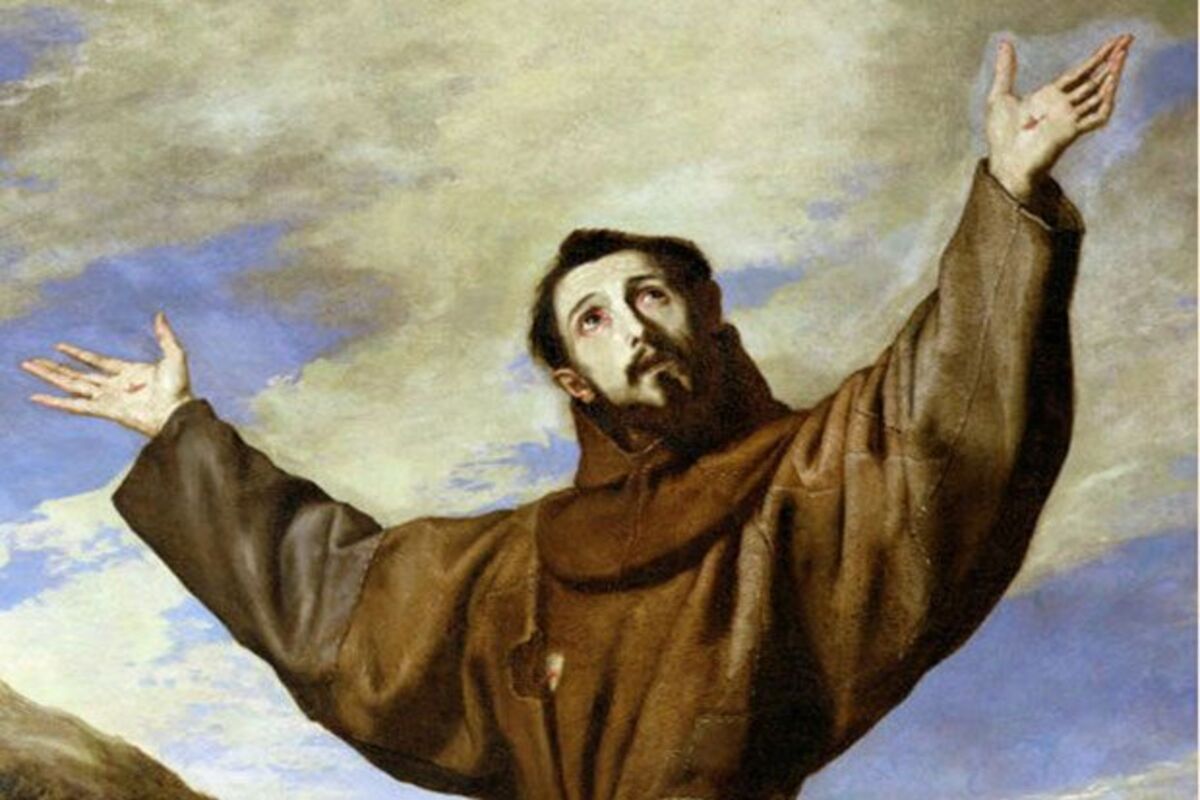Saint Francis of Assisi (1181/2-1226) was no stay-at-home hermit. In 1202, he had participated in war and been taken prisoner. He travelled to Rome in 1209 to seek endorsement of his order from Pope Innocent III, and his institutional structure requiring poverty and chastity was officially approved by Pope Honorius III in 1223.
“Obedience” versifies Ann Wroe, “presides in libraries of bulls… Holy Obedience binds you cord/neck, breast and ankles to the Lord.” Francis went to Egypt in 1219 in an attempt to convert the Sultan to bring the hostilities of the Fifth Crusade to an end. While it did not succeed, the Franciscan order has existed in the Holy Land since 1217.
Advertisement
Francis was canonised as early as 1228 by Pope Gregory IX and is the patron saint of Italy. In 2013, upon becoming Pope, Archbishop Cardinal Jorge Mario Bergoglio of Argentina chose Francis as his papal name, the first Pope to do so. He stated at his inauguration that this was a reflection of his concern for the poor.
Advertisement
Francis was the patron of the doctrine of absolute poverty, which two centuries later, under Pope John XXII, must rank as one of the most curious of all medieval doctrinal controversies because for some time, the energies of the greatest scholastics in Christendom were devoted to discussing the issue: did Christ and the apostles have property individually or in common, or not?
Author and poet Ann Wroe is best known as a biographer, with Pontius Pilate, Perkin Warbeck, Shelley and Orpheus to her name, but is never far distant from spirituality and poetry; her Six Facets of Light (2016) was a meditative poem in prose. In this book, she draws inspiration from the life of St Francis and her book of poems in four segments follows his life through conversion, mission, oblation and consummation. The main source for the narrative is Thomas di Celano, a fellow Franciscan monk, Francis’ contemporary and earliest biographer.
Like Gautam Buddha, Francis was born into luxury and indulged himself. In 1205, he undertook a pilgrimage to Rome and joined poor people in begging. Like Buddha, Francis foreswore all material comforts from around 1207 when he was 25, and in consequence of a meeting with lepers “it seemed too bitter to me to see lepers and the Lord himself led me among them”. Wroe writes, “but now you kiss that rotting flesh/slow, stomach turned” and follows this with a poem about a tramp in a supermarket in Brighton to place a parallel in a modern setting.
After his conversion to spirituality, “compassion for the Crucified” took over Francis’ soul and he set about the restoration and cleanliness of churches. He was joined by a few other pious companions, and this was the origin of the brotherhood of Franciscans. “When the Lord gave me some Brothers,” wrote Francis, “no one showed me what to do”, but the founder was severe with his followers if they did not abide by his example of self-mortification, including clothing of a thorny brown character, “a thing the world would never covet”.
Even that covering he was prone to divest, saying “The body is ever at variance with all that is good”. Wroe comments in verse, “No need for tunic, cloak or drawers/all that is falsely labelled yours/This is your body, white and spare/tensing and scrawny in the air/Naked you are His indeed/uncovered, unadorned and freed.” By 2020 the Franciscans numbered around 1,000 brothers, some being sent abroad on missions.
Francis also spurned money and was proud of receiving alms in return for God’s love. Celano adds, “He gave up everything that he might cling to Lady Poverty more closely”, this being reminiscent of the Hindu yogi. Like Buddha again, he founded an order for women starting with his first female follower Clare, who was only 18 when she submitted to his discipline, but Francis eschewed the company of women as if for fear or terror. When he preached to them, it was with eyes averted.
Francis was what today we would term ecologically friendly. Like Buddhists and Jains, he respected all of creation and living things, worms, birds, wolves, fishes, sheep; and he “tended to flee human company and go off to the most remote places so that … only the wall of the flesh would stand between him and God.”
In 1220, he enacted the first Nativity tableau with live animals, and in 1224, he received from an angel the stigmata or signs of the crucifixion, the gift of the five wounds of Christ. Wroe versifies, “Cautiously you stand, /although you know/with rising calm and love, that some/strange sacred stone/has lamed both spavined feet, as if/forced through the bone.”
Wroe approaches her subject with charm, sympathy and the lightest of touches. Interspersing her poems with short documented references to Francis’ life along with parallels in verse to his teachings in our present lives, she evokes respect and reflection. We are constantly reminded of spiritual similarities and journeys of devotion that have arisen and developed in our own multi-faith country.
The reviewer is India’s former foreign secretary
Advertisement











